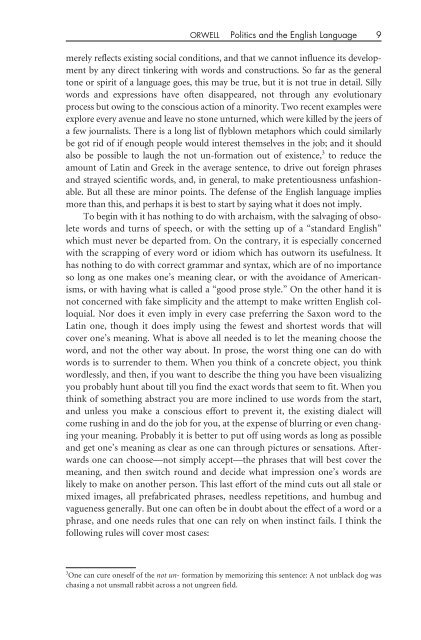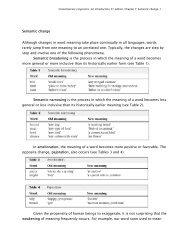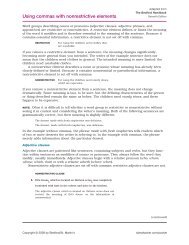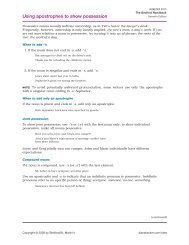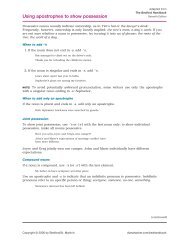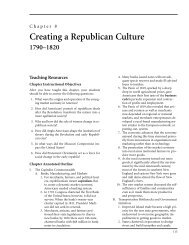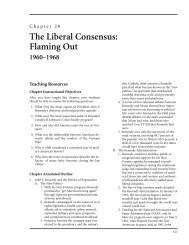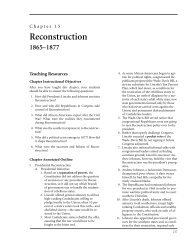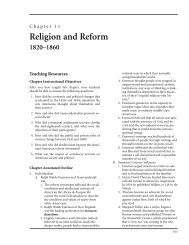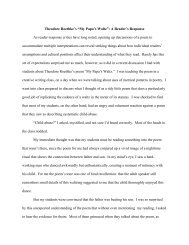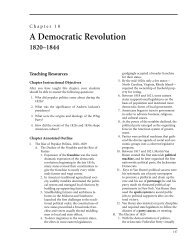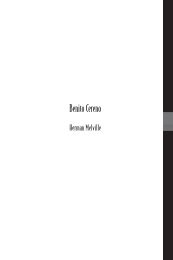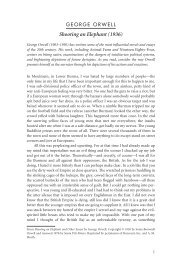GEORGE ORWELL, Politics and the English Language
GEORGE ORWELL, Politics and the English Language
GEORGE ORWELL, Politics and the English Language
Create successful ePaper yourself
Turn your PDF publications into a flip-book with our unique Google optimized e-Paper software.
<strong>ORWELL</strong> <strong>Politics</strong> <strong>and</strong> <strong>the</strong> <strong>English</strong> <strong>Language</strong> 9<br />
merely reflects existing social conditions, <strong>and</strong> that we cannot influence its development<br />
by any direct tinkering with words <strong>and</strong> constructions. So far as <strong>the</strong> general<br />
tone or spirit of a language goes, this may be true, but it is not true in detail. Silly<br />
words <strong>and</strong> expressions have often disappeared, not through any evolutionary<br />
process but owing to <strong>the</strong> conscious action of a minority. Two recent examples were<br />
explore every avenue <strong>and</strong> leave no stone unturned, which were killed by <strong>the</strong> jeers of<br />
a few journalists. There is a long list of flyblown metaphors which could similarly<br />
be got rid of if enough people would interest <strong>the</strong>mselves in <strong>the</strong> job; <strong>and</strong> it should<br />
also be possible to laugh <strong>the</strong> not un-formation out of existence, 3 to reduce <strong>the</strong><br />
amount of Latin <strong>and</strong> Greek in <strong>the</strong> average sentence, to drive out foreign phrases<br />
<strong>and</strong> strayed scientific words, <strong>and</strong>, in general, to make pretentiousness unfashionable.<br />
But all <strong>the</strong>se are minor points. The defense of <strong>the</strong> <strong>English</strong> language implies<br />
more than this, <strong>and</strong> perhaps it is best to start by saying what it does not imply.<br />
To begin with it has nothing to do with archaism, with <strong>the</strong> salvaging of obsolete<br />
words <strong>and</strong> turns of speech, or with <strong>the</strong> setting up of a “st<strong>and</strong>ard <strong>English</strong>”<br />
which must never be departed from. On <strong>the</strong> contrary, it is especially concerned<br />
with <strong>the</strong> scrapping of every word or idiom which has outworn its usefulness. It<br />
has nothing to do with correct grammar <strong>and</strong> syntax, which are of no importance<br />
so long as one makes one’s meaning clear, or with <strong>the</strong> avoidance of Americanisms,<br />
or with having what is called a “good prose style.” On <strong>the</strong> o<strong>the</strong>r h<strong>and</strong> it is<br />
not concerned with fake simplicity <strong>and</strong> <strong>the</strong> attempt to make written <strong>English</strong> colloquial.<br />
Nor does it even imply in every case preferring <strong>the</strong> Saxon word to <strong>the</strong><br />
Latin one, though it does imply using <strong>the</strong> fewest <strong>and</strong> shortest words that will<br />
cover one’s meaning. What is above all needed is to let <strong>the</strong> meaning choose <strong>the</strong><br />
word, <strong>and</strong> not <strong>the</strong> o<strong>the</strong>r way about. In prose, <strong>the</strong> worst thing one can do with<br />
words is to surrender to <strong>the</strong>m. When you think of a concrete object, you think<br />
wordlessly, <strong>and</strong> <strong>the</strong>n, if you want to describe <strong>the</strong> thing you have been visualizing<br />
you probably hunt about till you find <strong>the</strong> exact words that seem to fit. When you<br />
think of something abstract you are more inclined to use words from <strong>the</strong> start,<br />
<strong>and</strong> unless you make a conscious effort to prevent it, <strong>the</strong> existing dialect will<br />
come rushing in <strong>and</strong> do <strong>the</strong> job for you, at <strong>the</strong> expense of blurring or even changing<br />
your meaning. Probably it is better to put off using words as long as possible<br />
<strong>and</strong> get one’s meaning as clear as one can through pictures or sensations. Afterwards<br />
one can choose—not simply accept—<strong>the</strong> phrases that will best cover <strong>the</strong><br />
meaning, <strong>and</strong> <strong>the</strong>n switch round <strong>and</strong> decide what impression one’s words are<br />
likely to make on ano<strong>the</strong>r person. This last effort of <strong>the</strong> mind cuts out all stale or<br />
mixed images, all prefabricated phrases, needless repetitions, <strong>and</strong> humbug <strong>and</strong><br />
vagueness generally. But one can often be in doubt about <strong>the</strong> effect of a word or a<br />
phrase, <strong>and</strong> one needs rules that one can rely on when instinct fails. I think <strong>the</strong><br />
following rules will cover most cases:<br />
3 One can cure oneself of <strong>the</strong> not un- formation by memorizing this sentence: A not unblack dog was<br />
chasing a not unsmall rabbit across a not ungreen field.


